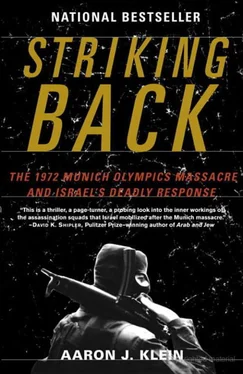The routine has been the same since Golda. The prime minister is given a top secret file with a picture of the proposed target, some background data, and a densely worded, multi-paged indictment. Most prime ministers avoided reading the indictment, skipping straight to the recommendation, which, of course, always urged death.
At times intelligence information failed to translate into explicit guilt, but in the case of Munich, each prime minister, from Golda Meir to Yitzhak Rabin, by way of Menachem Begin, Yitzhak Shamir, and Shimon Peres, thought that the vengeful killing of saya’an s and terrorists alike was the proper response to that dreadful massacre. Not one of them said “let it go.” Most of them never even asked the basic questions: Does this activist, implicated in the Munich Massacre, still have a role in terror attacks? Is he a threat today? Palatable words and titles like “logistical terror assistant” and “architect” were created, and would be found in the recommendation section of the indictments handed to the prime minister. But “architect” could easily refer to someone who once said something along the lines of “Italy could be a good place for an attack now.” For that, he could pay with his life.
Prime Minister Menachem Begin trusted “our boys.” He did not examine details. Shimon Peres, in contrast, fired off numerous questions. He was not fond of assassination missions. That changed in 1996. At the time he was in an election campaign against right-wing Likud Party candidate Benjamin Netanyahu. During the three months leading up to the election, Islamic Jihad and Hamas carried out numerous deadly bus bombings and other terror attacks, claiming many Israeli lives and taking a toll on the national mood. Peres feared a high-profile attack on the eve of the elections, certain to sink his chances of winning. Peres turned to the Mossad. He asked them to prepare assassination missions that could be ready to go at a moment’s notice, carried out within twenty-four hours. He ruled out Syria (diplomatic negotiations) and Jordan (a close neighbor and friend), leaving only second-tier countries. Caesarea, displeased with the nature of the task, prepared a number of missions, targeting saya’an s. In the end, there was no attack and no Israeli response.
Yizhak Shamir was the easiest prime minister to work with. As a former member of the Lechi, the pre-state Jewish underground, and of the Mossad, Shamir reveled in the details, and avoided political excuses. He never said, “I’m going to Paris for a diplomatic visit next week and it would be improper for there to be a mission there concurrently.” He was willing to authorize. One of the few times he refused to do so was in December 1987. Shamir was in the hospital at the time. Caesarea was in a good position to assassinate a senior member of Ahmed Jibril’s Popular Front for the Liberation of Palestine—General Council (PFLP-GC). The man, allegedly responsible for numerous attacks against Israel, was on the hit list and the assassins were in place. Shabtai Shavit went to the hospital, seeking Shamir’s approval. When he returned, he told the expectant Mossad officers that Shamir had not been in the mood to talk about it, granting the PFLP-GC operative his life.
Each prime minister’s military aide could receive all transmissions and codes as they were issued over the course of a mission in a very high-tech twenty-four-hour operations room. Prime ministers responded differently as missions unfolded. Some said, “Keep me posted.” Others, “Let me know when it’s over.”
TUNIS
MONDAY, JANUARY 14, 1991
The annals of history will record a strange scene in the theater of the absurd that can define the Israeli-Palestinian conflict. The notorious terrorist Abu-Iyad, responsible for the Munich Massacre and other bloody attacks, was assassinated in Tunis in January 1991—not by Israeli assassins after a dogged two-decade chase, but rather by one of his own bodyguards, out of an ideological conviction that Abu-Iyad was overly conciliatory toward Israel. The killer, recruited by Abu Nidal’s group, a cruel and reactionary organization, was ordered to assassinate Abu-Iyad not long after he declared that a Palestinian state should rise alongside Israel, and not in place of it.
Salah Khalaf, better known as Abu-Iyad, was one of the key figures in internal Palestinian politics. He, along with Yasser Arafat, was one of the founding fathers of Fatah. Early on, Abu-Iyad was considered a militant and a hard-liner, advocating an unflinching campaign of terrorism and violence against Israel and Jordan. As head of the United Security Apparatus he guided a cadre of young Palestinian operatives through the ranks, gaining their enduring admiration and devotion—men such as Fakhri Al-Omri, Atef Bseiso, Amin Al-Hindi, and Tawfiq Tirawi.
Since the mid-1960s, Fatah’s earliest days, Abu-Iyad had been responsible for terror operations that claimed the lives of many Israelis, including the Olympic attack, remembered as the Munich Massacre. Despite his denials of both culpability and involvement in Black September, Abu-Iyad topped Israel’s Most Wanted list. Israel was driven by preventive considerations—to permanently halt the agile mind of the former philosophy teacher, who continuously conjured new and innovative attacks, always seeing them to fruition. The Israelis also wanted to make it clear to the terrorist activists and leaders that they were hunted for their sins, hoping to deter them and others from joining their ranks. Finally, and most important, the Israelis wanted to punish him, to exact revenge for Munich. Every Israeli intelligence officer dreamed of commanding the mission that would put Abu-Iyad six feet underground.
Abu-Iyad, a Palestinian, born in the city of Jaffa in 1933, remembered, even took pride, in the close ties his family had with Jews in Palestine during the 1940s. His father spoke Hebrew, he said. One day before Israel declared its independence, his family fled on a small ship to Egypt-controlled Gaza, instantly becoming refugees along with hundreds of thousands of Palestinians. The day of flight was imprinted in the memory of the fifteen-year-old youth.
A world-class orator, he would draw Palestinian crowds out of their seats even as he was seen ascending a podium. There was nothing in his appearance to suggest a fighter or a revolutionary, nor did he cultivate such an image. He was short, chubby, and solid; his face was round and full, his eyes were framed with bushy black eyebrows, and his thin, combed-back hair and mustache were graying. His dress was firmly middle-class, preferring an untailored blazer to the army uniform worn by Arafat and mimicked by many.
He knew his life was in constant danger, and not just from Tel Aviv. The Mukhabarat, a generic name for Arab nations’ notorious internal secret-police apparatuses, sought to incapacitate him too. Jordan led the charge. Abu-Iyad was responsible for numerous assassination plans and several actual attempts to kill Jordan’s monarch, King Hussein. He spearheaded the operation in Khartoum to liberate Abu-Daoud, the grandiose plan to topple the king and initiate a revolution in Jordan in February 1972, and an assassination attempt on King Hussein at the Rabat Conference in Morocco in 1974, which was foiled with the help of a Mossad tip that was passed to Jordan through Moroccan intelligence.
Abu-Iyad took precautions. Four armed guards took turns protecting him. But his fears only increased with time. In the spring of 1973, he heard his peers gunned down in the middle of the night by IDF forces during the Spring of Youth operation. In the late 1970s a feud developed between the PLO and the Egyptian administration once the latter signed a peace agreement with Israel, turning its back on the Palestinian problem. His relationship with Syrian president Hafez Al-Assad was testy as well; Abu-Iyad attacked him repeatedly in his oratory.
Читать дальше












